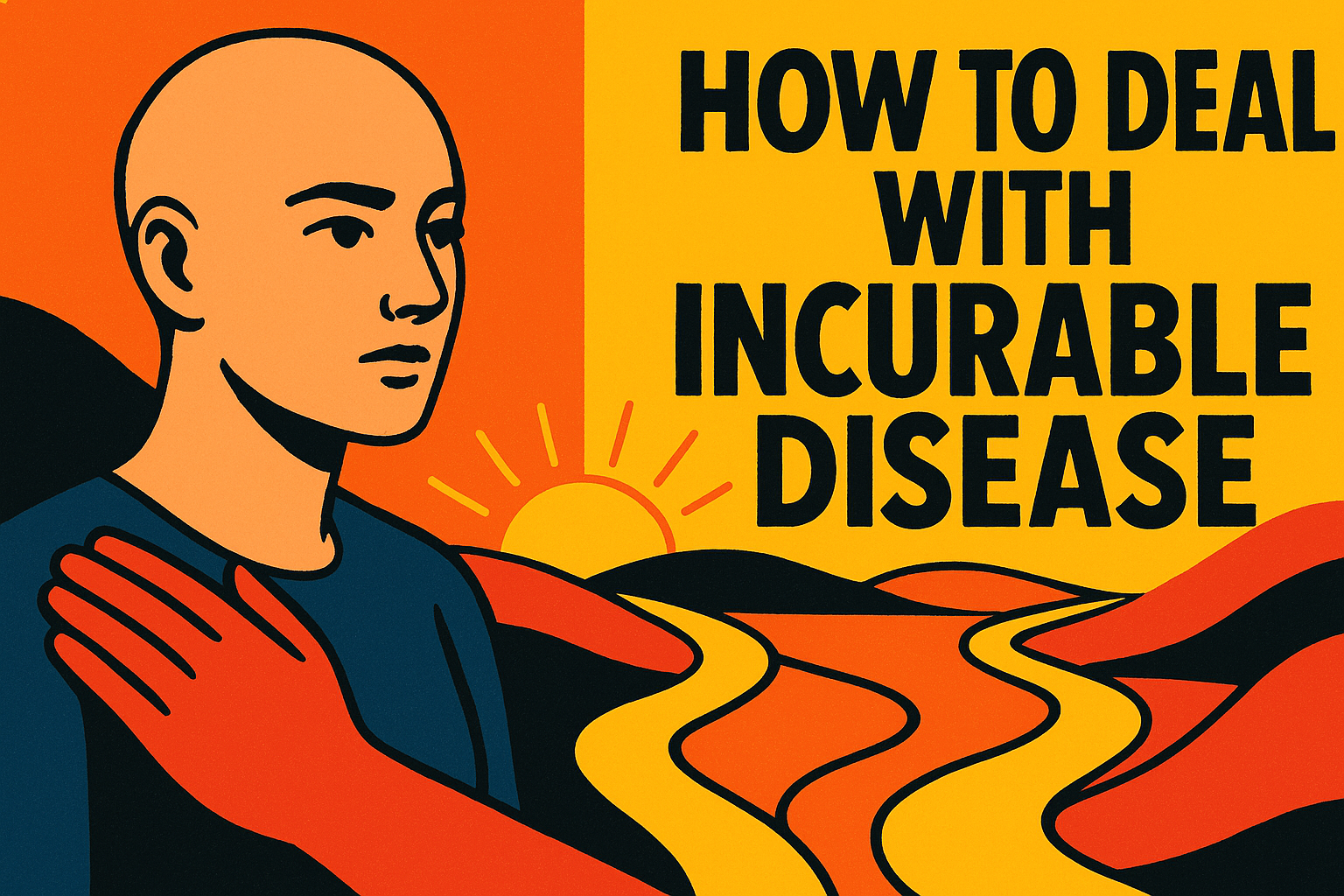Learning how to deal with incurable disease can feel lonely, scary, and overwhelming. Serious illnesses often lead to tough emotions like sadness, worry, anger, or feelings of being alone.
This post gives you nine handy tips on building support systems and routines that improve your health and daily life. Keep reading for ways to thrive despite your illness.
Key Takeaways
Accepting your condition isn’t giving up—it’s making room for your challenges and your dreams to coexist side-by-side.
Roughly 60% of people with migraines also struggle with anxiety disorders, and almost half experience depression along with physical pain.
Leaning on family, friends, or professional counselors for support can offer emotional comfort and practical solutions during difficult days.
Practicing stress-relief methods like slow breathing exercises, gentle yoga stretches, or simply stepping outdoors can noticeably lessen flare-ups.
Being proactive about medical knowledge and clearly talking to your doctor puts you in charge of your own care.
Table of Contents
Understanding the Emotional Impact of an Incurable Disease

Getting a tough health diagnosis can hit you like a truck and turn your world upside down. You might feel waves of shock, anger, and deep sadness as you process what this news means for your life.
Common emotional responses to a diagnosis

Learning you have an incurable illness can spark a powerful wave of emotions. Many women feel angry, scared, or deeply sad after getting this news. Your mind might fill with worries about what lies ahead, or sadness for the health you’ve lost.
All of these feelings are normal parts of coping with serious illness. You might also find yourself feeling helpless or lonely as you process this difficult news.
Your emotional responses can vary greatly depending on your age, your personality, and who you have around you for support. Some days might feel full of denial, while other days bring sharp awareness that life is limited.
The mix of regret, frustration, and shifting self-identity can lead to serious mental health struggles that deserve thoughtful care.
Having strong support from friends, family, or other social connections can make these emotions easier to handle. You might notice your feelings shifting from day to day—one moment feeling almost fine, and the next overwhelmed by stress.
These ups and downs are normal, and a common part of processing difficult feelings about a chronic illness.
Processing shock and grief

Hearing a diagnosis often triggers strong reactions—and women typically need some time to sort through their deeper feelings. Shock usually hits first, bringing numbness or a foggy mind.
It’s your brain’s way of softening the blow of this news. This phase might last several hours or even days, depending on the individual. You could find yourself just going through everyday tasks without truly feeling present.
Next, grief sinks in as reality becomes clearer. Grief isn’t simply sadness—it’s often mixed with fear, anger, or even guilt. Women often describe emotional waves that wash over them unexpectedly.
Your body might react, too, with disrupted sleeping patterns or shifts in appetite. Counseling sessions with someone experienced in chronic illness can offer helpful strategies to handle grief without sliding into deep despair.
Support groups are also valuable, letting you connect with others who genuinely understand these complicated emotions.
Acceptance and Adaptation

Accepting your incurable disease means finding a new normal rather than fighting against reality. You can adapt to life with chronic illness by seeing yourself as more than just your health problems.
Embracing acceptance of your reality

Dealing with an incurable illness means adjusting to a “new normal“. I’ve learned that making peace with my condition doesn’t equal losing hope—it simply means accepting where I am right now.
Research shows that coping through acceptance leads to fewer mental health struggles, such as anxiety and shame. This isn’t surrendering to illness; it’s about creating space for both your condition and your personal goals to coexist.
Several women in my support group even say they feel more in charge after letting go of the fight against their diagnosis.
Your illness forms only a piece of who you are—not your entire self. Try not to allow it to dominate every area of life. Caring for yourself gets easier once you accept your current situation without judgment.
On challenging days, I gently remind myself acceptance takes time—it doesn’t happen all at once. Simple relaxation methods—like deep breathing or listening to calming music—can make the process smoother.
Perfect acceptance isn’t the goal. Instead, it’s about discovering meaningful ways to live well, even with health issues present.
Avoiding overidentification with the illness

You mean much more than any diagnosis. Many women, after learning they have an incurable illness, begin defining themselves solely as “the sick person”. This mindset can deepen feelings of anxiety and depression—but it doesn’t have to.
Try seeing yourself separately from your condition. An illness is only one small part of you, not your identity. Keep up with hobbies you love, whenever you can. Continue roles at work, connect socially, and do what reminds you of your full, vibrant self.
The art of living well with chronic illness lies in owning your condition without letting it own you.
Self-care becomes truly important on this path. With friends and family, talk about topics other than your health. Create small moments daily that are free from illness-related thoughts—moments centered around simple life pleasures.
Joining support groups can help you express feelings safely, but make sure to balance those sessions with everyday routines. This approach helps ease emotional stress and builds inner strength.
Your health issue might demand some energy and attention, yet it doesn’t define your worth—or your capacity for joy and purpose.
Building a Support System

You need people who care about you when facing a hard disease. A good support network helps you deal with tough days and gives you a place to share your fears.
Reaching out to family and friends

Opening up about your health journey can build a strong circle of support during challenging times. Being transparent about a chronic illness helps loved ones grasp your situation clearly and shows them ways to assist.
- Begin by opening up to a single trusted friend or relative who makes you comfortable sharing your diagnosis.
- Clearly mention what type of assistance helps most—rides to appointments, preparing meals, or simply being there to listen.
- Describe your symptoms and limits using straightforward terms instead of complicated medical talk that might confuse people.
- Establish personal limits on the extent of health-related conversations to safeguard your emotional comfort zone.
- Be patient if reactions seem uncomfortable or awkward at first, and give loved ones some space and time to adjust.
- Explore online support networks geared specifically for your health condition, connecting with people who truly get your situation.
- Suggest social meetups that match your current stamina, staying connected without draining yourself.
- Express gratitude openly to everyone offering support, encouraging continued care and strengthening relationships.
- Set up a quick group text or phone chain for health updates, saving energy during symptom flares by avoiding repetitive talks.
- Turn to a trusted friend as your “social planner” on days when making arrangements feels overwhelming.
Outside your circle, trained counselors and formal support groups provide specialized emotional help and practical strategies for managing your health journey.
Seeking professional counseling or support groups

Family and friends give you comfort and care, but expert support offers practical tools for managing illness. Connecting with support groups helps you find others dealing with similar incurable conditions—people who truly relate to your experience.
- Reach out to mental health specialists who work specifically with chronic illnesses. Health psychologists can show you ways to handle pain, emotional struggles, and everyday stress.
- Talk to your healthcare provider about finding professional counselors. Doctors usually know reliable therapists experienced in helping people with chronic diseases.
- Look into your insurance policy to see if it covers counseling sessions. Many policies now count mental health visits as part of ongoing care for chronic conditions.
- Find face-to-face support groups at local hospitals or community centers. These meetings offer comfortable spaces where you can openly talk about your feelings without feeling judged.
- Explore online support groups if getting around physically is a challenge. Virtual meetings let you connect easily with others wherever you live.
- Look into support organizations dedicated specifically to your illness. These groups host regular gatherings focused on helpful advice and shared understanding about your condition.
- Try professionally led group counseling sessions. These meetings combine helpful emotional support from peers with expert tips for handling stress and emotional issues.
- Sign up for educational events about your disease. Many support groups provide learning workshops helping you meet others and better understand your situation.
- Experiment with multiple groups to discover your ideal match. Each group has its unique atmosphere—feel free to test out several before deciding where you fit best.
- Set clear rules for yourself about what personal information you share. You have complete control over how much of your story you choose to discuss, allowing trust to grow naturally with group members.
Managing Mental Health

Mental health matters just as much as physical health when living with an incurable disease. Finding ways to deal with your feelings can make daily life more bearable and even help reduce some physical symptoms.
Coping with anxiety and depression

Anxiety and depression often show up alongside chronic, incurable conditions. Studies indicate that around 60% of migraine sufferers deal with anxiety disorders, and nearly half face depression.
These emotional struggles can complicate daily routines, but certain coping methods can provide relief. Progressive muscle relaxation helps ease physical stress, while meditation can calm anxious thoughts.
Regular physical exercise also proves helpful for many women, as it releases the brain’s natural mood boosters. Speaking openly with a therapist skilled in chronic illness can offer valuable strategies for emotional relief.
Your emotional health deserves equal attention as your physical symptoms. Avoid trying to handle anxiety and depression on your own with alcohol, caffeine, or other stimulants—they often worsen emotional struggles and disease flare-ups.
Instead, connect with others through peer support groups, people who genuinely understand what you’re dealing with each day. Poor sleep tends to heighten anxiety levels, so forming a gentle, relaxing bedtime routine can help break this pattern.
Seeking guidance and support never signals weakness—rather, it plays a necessary role in managing your condition effectively.
Practicing stress management techniques

Taking care of your mental health involves more than just managing depression or anxiety—especially if you’re dealing with a chronic illness. Simple stress relief techniques can help calm your mind and body during tough moments:
- Deep breathing exercises lower stress hormones in your system and ease tension. Personally, whenever my heart disease flares, I pause to take five slow breaths, and it genuinely quiets my mind.
- Progressive muscle relaxation reduces physical strain that builds up on tough days. This process means gently tightening, then relaxing, each muscle from your toes upward to your head.
- Guided imagery can mentally transport you to calming, safe spaces when pain or worry become overwhelming. Several free apps offer brief guided sessions, usually just 5–10 minutes long.
- Mindfulness meditation gently shifts your mind back into the present instead of dwelling on future worries. Regular practice has been shown to lower blood pressure and improve overall sleep quality.
- Gentle yoga connects soft movements with steady breathing, easing physical tension and stress. Even chair yoga is effective if your mobility is limited or you’re dealing with chronic pain.
- Journaling helps you process complicated feelings related to your health and daily life. Spending about ten minutes each day putting your thoughts on paper can lessen emotional strain and help clarify your perspective.
- Spending time in nature naturally reduces stress levels and boosts your mood. Even a brief outdoor walk each day can lift your spirits more than indoor activities can.
- Creative activities like art, music, or crafting provide a healthy emotional outlet, allowing you to shift focus from illness toward self-expression and joy.
- Connecting socially pushes away isolation, which often comes hand-in-hand with long-term health challenges. Having an open, real conversation with friends who truly understand can ease emotional pain far better than handling difficulties alone.
Implementing Self-Care

Self-care isn’t a luxury but a must when facing an incurable disease. You need daily habits that boost your energy and lift your mood, from gentle walks to mindful breathing.
Prioritizing physical and mental well-being

Facing an incurable illness means prioritizing your body and mind—above all else. Even small acts of care can greatly ease chronic symptoms like anxiety and depression. After my own diagnosis, short walks—just 10 minutes outside—or even five minutes spent breathing deeply improved my mood noticeably.
Your physical condition directly impacts your emotional health. Getting restful sleep, eating nutritious food regularly, and gentle exercise build a stable foundation to handle health challenges.
Many women neglect caring for themselves, often feeling guilty or pressed for time, but these simple habits actually boost happiness and lead to better health.
Self-care isn’t selfish; it’s the oxygen mask you must put on first before helping others.
Make room for enjoyable activities in your daily routine—maybe reading, gardening, or spending time chatting with friends. Relaxation methods like meditation help lower anxiety and ease tension.
Increasing strength, through safe and suitable exercise, can also improve your independence and mood. Consider choosing an understanding muscular woman trainer, familiar with your specific health limitations.
Social connections matter greatly too, so feel free to lean on others whenever you need support.
Pursuing activities that bring joy and meaning

Joy can make a huge difference, especially if you’re dealing with a chronic illness. Try picking up hobbies you used to love but haven’t practiced lately. Activities like painting, gardening, or playing music offer comfort during rough days.
Even a brief time spent doing something enjoyable can ease some stress from treatments. Many women find creative projects helpful in calming anxiety because the activities shift their minds away from health worries.
Social activities also help build strong friendships through common interests. You might join a local book club, take cooking classes with others, or volunteer for something meaningful to you.
These types of gatherings expand your support circle and add structure and purpose to each day. The enjoyment comes not just from doing something fun, but also from meeting and connecting with new people.
Research even indicates that women who regularly take part in social activities manage chronic illnesses more effectively and report feeling less emotionally overwhelmed.
Managing Medical Treatment

Your medical treatment plan works best when you take an active role in it. Smart patients ask questions about their options and track how well each treatment helps their symptoms.
Staying informed about treatment options
Knowledge gives you strength, especially while dealing with a serious illness. Always ask plenty of questions during doctor visits, and never hesitate to get a second opinion about available care choices.
For me, carrying a small notebook—where I could quickly jot down side effects—made talks with my doctors much easier and clearer. Many patients overlook important details at doctor appointments due to stress or emotional strain.
Writing down your questions and tracking symptoms in advance can make these visits less stressful and more productive. Medical conditions can have multiple treatment pathways, so getting informed helps you pick the options aligned with personal goals and values.
Medical science moves fast—with new treatments emerging all the time. Try looking into your condition through reliable resources like medical journals or patient advocacy organizations.
Early Access Care can help patients find innovative therapies and clinical trials, some even unavailable through regular healthcare providers.
Support groups can also offer practical tips on handling symptoms or side effects that doctors might miss mentioning. Staying involved in healthcare decisions can ease feelings of helplessness and build strength against the ups and downs of chronic illness.
Collaborating with healthcare providers
Your medical team is your partner in managing your health. At each visit, I chat openly with my doctors about how treatments are working and which side effects trouble me most. The CDC emphasizes that chronic illnesses require continuous medical care, so building strong relationships with your providers really matters.
Make sure you ask about available treatments, and let the doctor know about day-to-day challenges. Your honest feedback lets healthcare professionals tweak your plan, making it fit your life more comfortably.
Many women say they feel rushed during visits, but jotting down a quick list beforehand can help you gather all the answers you need.
Good communication with your care team truly boosts quality of life. One time, after I explained how my medication disrupted my sleep, my doctor quickly suggested an alternative. Your providers have experience with your unique condition, and their insights can make daily activities simpler to manage.
Be up-front with them about your goals, worries, and hopes. Teamwork like this lowers the risk of health issues and gives you greater control over your situation. Having social support from healthcare staff and friends or family creates a solid base for coping with chronic illness.
Improving Daily Life with Routine Adjustments

Living with an incurable disease means reshaping your daily habits to match your new needs. Small changes to your routine can make a big difference in how you feel each day.
Setting realistic goals and expectations
Setting goals with an incurable illness feels tough—sometimes even overwhelming. Often, women push themselves beyond their limits, causing stress, exhaustion, and burnout. So start small; set daily targets that match your current energy.
Break larger tasks into mini, manageable pieces you can finish comfortably in one sitting. Your objectives might differ from before, and that’s perfectly fine. Society’s pressure to “push through”, no matter what, promotes toxic positivity—which usually does more harm than good.
Keep track of your daily progress in a notebook or an easy-to-use wellness app. This helps you spot useful patterns and trends in your physical and mental health. On days when you’re struggling, stick mainly to basic self-care tasks, not large or demanding projects.
Shift your idea of a successful day according to your feelings and energy—not someone else’s standards or capabilities. This approach gradually reduces emotional stress, building your resilience step by step.
Many support groups offer valuable, practical guidance for goal-setting that respects your body’s natural limits, yet still boosts your sense of purpose.
Adapting your lifestyle for better management
Small changes in your daily habits can greatly improve life with an incurable illness. First, maintain a steady sleep routine that offers your body plenty of rest—this will help you recover and fight fatigue.
Many women notice relief by eating healthy foods like leafy green veggies, whole grains, and lean proteins. Such nutritious meals can ease symptoms and boost your energy levels, too.
Gentle exercise—such as short walks or chair yoga—can lower stress and lift your mood. Together, these healthy choices can ease physical pain and emotional struggles often linked with long-term illness.
The way you organize your home makes a different kind of impact. Moving furniture to clear pathways helps reduce falls. Simple tools that help with everyday tasks also make life easier.
Creating a soothing place at home for quiet relaxation can lower stress levels. Keep track of daily activities in a journal—this helps spot what triggers flare-ups, so you can avoid them later.
Many women with arthritis or multiple sclerosis notice that planning short rest breaks throughout the day prevents tiredness and keeps their energy up. Building strong relationships, where you openly share your needs, completes your personal circle of support.
Supporting Relationships

Living with an incurable disease affects more than just you—it changes your bonds with others too. Strong connections can lift your spirits and ease your path, but they need care and honest talks to thrive.
Communicating openly with loved ones
Opening up about your illness to family and friends builds connections instead of barriers. Many women worry their loved ones might struggle with hearing honest details about their condition.
Yet, talking openly helps everyone cope better with chronic health issues. You might start by clearly explaining your symptoms or their possible causes—in simple, everyday words.
An honest, straightforward talk fights the loneliness that often creeps in with a long-term sickness. Your loved ones truly want to help out, but they can’t guess how unless you share what’s happening with you.
Clear and honest communication also helps set healthy limits for both you and your loved ones. Tell others exactly what type of help you’d prefer or if you just need some time alone.
Maybe some days you would enjoy having company to the doctor’s office, but other times you prefer peace and quiet to process your emotions. Being direct about your needs reduces confusion, which can otherwise add to stress.
Most family members actually feel relieved—instead of overwhelmed—if they clearly understand the best ways to support you. An open, honest approach strengthens relationships and eases emotional strain all around.
Setting boundaries to maintain balance
Saying “no” can actually give you space to care for yourself, especially if you’re managing a chronic condition. Setting clear limits with family, friends, and even your doctors can protect your energy for what’s really important—your own needs and self-care routine.
I learned this firsthand after my COPD diagnosis, when constantly being available to others left me worn out and exhausted. Creating firm boundaries can strengthen relationships instead of weakening them.
Boundaries build self-esteem, improving mental and physical health during difficult periods.
As your health changes, your personal needs will shift too. So, your boundaries need to stay flexible as you adjust to new circumstances. Be open about what you can—and can’t—manage right now.
Simple, direct phrases like, “Today, I really need some rest”, or “I can help out for an hour instead of three”, clearly communicate your limits without guilt or awkwardness. Healthy boundaries can help you stay balanced and positive, even while facing serious health issues.
How Will the Experience of Living with an Incurable Disease Evolve in 2025?

Life with an incurable illness will look very different by 2025. Exciting medical breakthroughs, like biologic treatments and gene-focused therapies, will offer you personalized health choices.
I’ve noticed firsthand how these medical advances ease pain and make day-to-day life brighter for many women dealing with chronic issues. Soon, wearable gadgets will closely monitor your body’s vital signs—allowing quicker identification of health issues before they worsen.
Mental health care will get better as well, with improved methods to reduce stress and emotional struggles. Smart watches might warn you about disrupted sleep patterns or rising blood pressure, giving you an early chance to fix the problem.
Doctors will stay closely connected, receiving instant updates straight from your health devices. This new connection will give you greater control over your own care, making the journey with chronic illness feel less lonely, more supported, and far more positive.
People Also Ask
What are the first steps to take after getting an incurable disease diagnosis?
Let yourself process and feel your emotions—you might experience grief or sadness after receiving news of a terminal illness like cancer. Next, speak openly with your doctor about possible treatments, symptom control, and ways to handle the situation mentally and emotionally. Also, surround yourself with a strong support system of family, friends, and caregivers to help manage daily challenges and emotional struggles.
How can I manage the stress of living with chronic health problems?
Try out relaxation methods like deep breathing exercises or meditation—these can lower anxiety and ease tension. Stay physically active within your comfort zone, as regular movement lifts your mood and reduces stress. Getting plenty of restful sleep is crucial too, since poor sleep habits can heighten irritability and worsen emotional strain.
What mental health issues often come with incurable diseases?
Many people facing long-term illnesses deal with depression, feelings of despair, anxiety, or even PTSD. Mood disorders and substance abuse issues sometimes crop up too, as a way to cope with ongoing suffering. If you start noticing these symptoms interfering with everyday life, consult a mental health professional for extra support and therapy.
How can family members be better caregivers for someone with an incurable condition?
Focus on becoming a strong listener and learn to respond with genuine empathy. Use respectful language that supports dignity and avoids making the person feel worse about their situation. Caregivers need to look after themselves too—taking breaks, finding support groups, and practicing self-care can prevent emotional exhaustion.
Can lifestyle changes help manage incurable diseases?
Yes, adopting healthy habits can often ease symptoms and help keep complications at bay—even with chronic illnesses like lung or heart conditions. Eating nutritious foods and engaging in appropriate physical activities can notably enhance daily life. Simple shifts in diet or routines often lower risks of related issues such as high blood pressure or renewed flare-ups.
Where can I find resources about coping with incurable diseases?
The American Psychological Association has several easy-to-read guides on building emotional strength and resilience during illness. Numerous disease-focused organizations also offer practical advice, treatment education, and local support groups to help you better handle everyday struggles. Many hospitals now provide special programs (like psycho-oncology or rehabilitation counseling) that teach coping skills and mindfulness techniques for those facing long-term illnesses.
References
https://www.apa.org/topics/chronic-illness/coping-diagnosis
https://dbm.maryland.gov/benefits/Documents/CopingShockGriefTragedy.pdf
https://www.bezzymigraine.com/discover/real-talk-mig/health-how-to-adapt-to-life-with-an-incurable-condition/ (2024-02-19)
https://mhanational.org/resources/accepting-reality/
https://www.helpguide.org/wellness/health-conditions/coping-with-a-life-threatening-illness
https://www.bezzymigraine.com/discover/living-well-mig/health-talking-to-friends-and-family-about-your-condition/ (2022-12-21)
https://www.mayoclinic.org/healthy-lifestyle/stress-management/in-depth/support-groups/art-20044655 (2025-03-27)
https://www.cdc.gov/tobacco/campaign/tips/diseases/depression-anxiety.html
https://www.cdc.gov/mental-health/living-with/index.html
https://www.helpguide.org/mental-health/stress/stress-management (2025-03-13)
https://www.helpguide.org/mental-health/wellbeing/self-care-tips-to-prioritize-your-mental-health (2025-04-11)
https://www.nimh.nih.gov/health/topics/caring-for-your-mental-health
https://richfieldmedicalgroup.com/2023/10/23/helpful-tips-for-chronic-disease-management/ (2023-10-23)
https://pmc.ncbi.nlm.nih.gov/articles/PMC4103232/
https://pmc.ncbi.nlm.nih.gov/articles/PMC6378489/
https://www.oakstreethealth.com/how-to-support-someone-with-chronic-illness-8-tips-to-help-1511058
https://www.helpguide.org/relationships/social-connection/setting-healthy-boundaries-in-relationships (2025-03-13)
